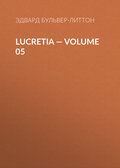
Эдвард Бульвер-Литтон
Pelham — Complete
CHAPTER LIX
I do defy him, and I spit at him,
Call him a slanderous coward and a villain—
Which to maintain I will allow him odds.
—Shakspeare.
I found Glanville walking before the door with a rapid and uneven step.
“Thank Heaven!” he said, when he saw me—“I have been twice to Mivart’s to find you. The second time, I saw your servant, who told me where you were gone. I knew you well enough to be sure of your kindness.”
Glanville broke off aburptly: and after a short pause, said, with a quick, low, hurried tone—“The office I wish you to take upon yourself is this:—go immediately to Sir John Tyrrell, with a challenge from me. Ever since I last saw you, I have been hunting out that man, and in vain. He had then left town. He returned this evening, and quits it to-morrow: you have no time to lose.”
“My dear Glanville,” said I, “I have no wish to learn any secret you would conceal from me; but forgive me if I ask for some further instructions than those you have afforded me. Upon what plea am I to call out Sir John Tyrrell? and what answer am I to give to any excuses he may create?”
“I have anticipated your reply,” said Glanville, with ill-subdued impatience; “you have only to give this paper: it will prevent all discussion. Read it if you will; I have left it unsealed for that purpose.”
I cast my eyes over the lines Glanville thrust into my hand; they ran thus:—
“The time has at length come for me to demand the atonement so long delayed. The bearer of this, who is, probably, known to you, will arrange with any person you may appoint, the hour and place of our meeting. He is unacquainted with the grounds of my complaint against you, but he is satisfied of my honour: your second will, I presume, be the same with respect to yours. It is for me only to question the latter, and to declare you solemnly to be void alike of principle and courage, a villain, and a poltroon.
“Reginald Glanville.”
“You are my earliest friend,” said I, when I had read this soothing epistle; “and I will not flinch from the place you assign me: but I tell you fairly and frankly, that I would sooner cut off my right hand than suffer it to give this note to Sir John Tyrrell.”
Glanville made no answer; we walked on till he stopped suddenly, and said, “My carriage is at the corner of the street; you must go instantly; Tyrrell lodges at the Clarendon; you will find me at home on your return.”
I pressed his hand, and hurried on my mission. It was, I own, one peculiarly unwelcome and displeasing. In the first place, I did not love to be made a party in a business of the nature of which I was so profoundly ignorant. Besides, Glanville was more dear to me than any one, judging only of my external character, would suppose; and constitutionally indifferent as I am to danger for myself, I trembled like a woman at the peril I was instrumental in bringing upon him. But what weighed upon me far more than either of these reflections, was the recollection of Ellen. Should her brother fall in an engagement in which I was his supposed adviser, with what success could I hope for those feelings from her, which, at present, constituted the tenderest and the brightest of my hopes? In the midst of these disagreeable ideas the carriage stopped at the door of Tyrrel’s Hotel.
The waiter said Sir John was in the coffee-room; thither I immediately marched. Seated in the box nearest the fire sat Tyrrell, and two men, of that old-fashioned roue set, whose members indulged in debauchery, as if it were an attribute of manliness, and esteemed it, as long as it were hearty and English, rather a virtue to boast of, than a vice to disown. Tyrrel nodded to me familiarly as I approached him; and I saw, by the half-emptied bottles before him, and the flush of his sallow countenance, that he had not been sparing of his libations. I whispered that I wished to speak to him on a subject of great importance; he rose with much reluctance, and, after swallowing a large tumbler-full of port wine to fortify him for the task, he led the way to a small room, where he seated himself, and asked me, with his usual mixture of bluntness and good-breeding, the nature of my business. I made him no reply: I contented myself with placing Glanville’s billet doux in his hand. The room was dimly lighted with a single candle, and the small and capricious fire, near which the gambler was seated, threw its upward light, by starts and intervals, over the strong features and deep lines of his countenance. It would have been a study worthy of Rembrandt.
I drew my chair near him, and half shading my eyes with my hand, sat down in silence to mark the effect the letter would produce. Tyrrel (I imagine) was a man originally of hardy nerves, and had been thrown much in the various situations of life where the disguise of all outward emotion is easily and insensibly taught; but whether his frame had been shattered by his excesses, or that the insulting language of the note touched him to the quick, he seemed perfectly unable to govern his feelings; the lines were written hastily, and the light, as I said before, was faint and imperfect, and he was forced to pause over each word as he proceeded, so that “the iron had full time to enter into his soul.”
Passion, however, developed itself differently in him than in Glanville: in the latter, it was a rapid transition of powerful feelings, one angry wave dashing over another; it was the passion of a strong and keenly susceptible mind, to which every sting was a dagger, and which used the force of a giant to dash away the insect which attacked it. In Tyrrell, it was passion acting on a callous mind but a broken frame—his hand trembled violently—his voice faltered—he could scarcely command the muscles which enabled him to speak; but there was no fiery start—no indignant burst—no flashing forth of the soul; in him, it was the body overcoming and paralyzing the mind. In Glanville it was the mind governing and convulsing the body.
“Mr. Pelham,” he said at last, after a few preliminary efforts to clear his voice, “this note requires some consideration. I know not at present whom to appoint as my second—will you call upon me early to-morrow?”
“I am sorry,” said I, “that my sole instructions were to get an immediate answer from you. Surely either of the gentlemen I saw with you would officiate as your second?”
Tyrrell made no reply for some moments. He was endeavouring to compose himself, and in some measure he succeeded. He raised his head with a haughty air of defiance, and tearing the paper deliberately, though still with uncertain and trembling fingers, he stamped his foot upon the atoms.
“Tell your principal,” said he, “that I retort upon him the foul and false words he has uttered against me; that I trample upon his assertions with the same scorn I feel towards himself; and that before this hour to-morrow, I will confront him to death as through life. For the rest, Mr. Pelham, I cannot name my second till the morning; leave me your address, and you shall hear from me before you are stirring. Have you any thing farther with me?”
“Nothing,” said I, laying my card on the table, “I have fulfilled the most ungrateful charge ever entrusted to me. I wish you good night.”
I re-entered the carriage, and drove to Glanville’s. I broke into the room rather abruptly; Glanville was leaning on the table, and gazing intently on a small miniature. A pistol-case lay beside him: one of the pistols in order for use, and the other still unarranged; the room was, as usual, covered with books and papers, and on the costly cushions of the ottoman, lay the large, black dog, which I remembered well as his companion of yore, and which he kept with him constantly, as the only thing in the world whose society he could at all times bear: the animal lay curled up, with its quick, black eye fixed watchfully upon its master, and directly I entered, it uttered, though without moving, a low, warning growl.
Glanville looked up, and in some confusion thrust the picture into a drawer of the table, and asked me my news. I told him word for word what had passed. Glanville set his teeth, and clenched his hand firmly; and then, as if his anger was at once appeased, he suddenly changed the subject and tone of our conversation. He spoke with great cheerfulness and humour, on the various topics of the day; touched upon politics; laughed at Lord Guloseton, and seemed as indifferent and unconscious of the event of the morrow as my peculiar constitution would have rendered myself.
When I rose to depart, for I had too great an interest in him to feel much for the subjects he conversed on, he said, “I shall write one line to my mother, and another to my poor sister; you will deliver them if I fall, for I have sworn that one of us shall not quit the ground alive. I shall be all impatience to know the hour you will arrange with Tyrrell’s second. God bless you, and farewell for the present.”
CHAPTER LX
Charge, Chester, charge!
—Marmion.
Though this was one of the first mercantile transactions of my life, I had no doubt about acquitting myself with reputation.
—Vicar of Wakefield.
The next morning I was at breakfast, when a packet was brought me from Tyrrell; it contained a sealed letter to Glanville, and a brief note to myself. The latter I transcribe:—
“My Dear Sir,
“The enclosed letter to Sir Reginald Glanville will explain my reasons for not keeping my pledge: suffice it to state to you, that they are such as wholly to exonerate me, and fairly to satisfy Sir Reginald. It will be useless to call upon me; I leave town before you will receive this. Respect for myself obliges me to add that, although there are circumstances to forbid my meeting Sir Reginald Glanville, there are none to prevent my demanding satisfaction of any one, whoever he may be, who shall deem himself authorized to call my motives into question,
“I have the honour,
“John Tyrrell.”
It was not till I had thrice read this letter that I could credit its contents. From all I had seen of Tyrrell’s character, I had no reason to suspect him to be less courageous than the generality of worldly men; and the conclusion of his letter, evidently pointed at myself, should I venture to impugn his conduct, seemed by no means favourable to any suspicion of his cowardice. And yet, when I considered the violent language of Glanville’s letter, and Tyrrell’s apparent resolution the night before, I scarcely knew to what more honourable motive to attribute his conduct. However, I lost no time in despatching the whole packet to Glanville, with a few lines from myself, saying I should call in an hour.
When I fulfilled this promise, Glanville’s servant told me his master had gone out immediately on reading the letters I had sent, and had merely left word that he should not return home the whole day. That night he was to have brought an important motion before the House. A message from him, pleading sudden and alarming illness, devolved this duty upon another member of our party. Lord Dawton was in despair; the motion was lost by a great majority; the papers, the whole of that week, were filled with the most triumphant abuse and ridicule of the Whigs. Never was that unhappy and persecuted party reduced to so low an ebb: never did there seem a fainter probability of their coming into power. They appeared almost annihilated—a mere nominis umbra.
On the eighth day from Glanville’s disappearance, a sudden event in the cabinet threw the whole country into confusion; the Tories trembled to the very soles of their easy slippers of sinecure and office; the eyes of the public were turned to the Whigs; and chance seemed to effect in an instant that change in their favour, which all their toil, trouble, eloquence, and art, had been unable for so many years to render even a remote probability.
But there was a strong though secret party in the state, which reminded me of the independents in the reign of Charles the First, that, concealed under a general name, worked only for a private end, and made a progress in number and respectability, not the less sure for being but little suspected. Foremost among the leaders of this party was Lord Vincent. Dawton, who knew of their existence, and regarded them with fear and jealousy, considered the struggle rather between them and himself, than any longer between himself and the Tories; and strove, while it was yet time, to reinforce himself by a body of allies, which, should the contest really take place, might be certain of giving him the superiority. The Marquis of Chester was among the most powerful of the neutral noblemen: it was of the greatest importance to gain him to the cause. He was a sturdy, sporting, independent man, who lived chiefly in the country, and turned his ambition rather towards promoting the excellence of quadrupeds, than the bad passions of men. To this personage Lord Dawton implored me to be the bearer of a letter, and to aid, with all the dexterity in my power, the purpose it was intended to effect. It was the most consequential mission yet entrusted to me, and I felt eager to turn my diplomatic energies to so good an account. Accordingly, one bright morning I wrapped myself carefully in my cloak, placed my invaluable person safely in my carriage, and set off to Chester Park, in the county of Suffolk.
CHAPTER LXI
Hinc Canibus blandis rabies venit
—Virgil Georgics.
I should have mentioned, that the day after I sent Glanville Tyrrell’s communication, I received a short and hurried note from the former, saying, that he had left London in pursuit of Tyrrell, and that he would not rest till he had brought him to account. In the hurry of the public events in which I had been of late so actively engaged, my mind had not had leisure to dwell much upon Glanville; but when I was alone in my carriage, that singular being, and the mystery which attended him, forced themselves upon my reflection, in spite of all the importance of my mission.
I was leaning back in my carriage, at (I think) Ware, while they were changing horses, when a voice, strongly associated with my meditations, struck upon my ear. I looked out, and saw Thornton standing in the yard, attired with all his original smartness of boot and breeches: he was employed in smoking a cigar, sipping brandy and water, and exercising his conversational talents in a mixture of slang and jokeyism, addressed to two or three men of his own rank of life, and seemingly his companions. His brisk eye soon discovered me, and he swaggered to the carriage door with that ineffable assurance of manner which was so peculiarly his own.
“Ah, ah, Mr. Pelham,” said he, “going to Newmarket, I suppose? bound there myself—like to be found among my betters. Ha, ha—excuse a pun: what odds on the favourite? What! you won’t bet, Mr. Pelham? close and sly at present; well, the silent sow sups up all the broth—eh!—”
“I’m not going to Newmarket,” I replied: “I never attend races.”
“Indeed!” answered Thornton. “Well, if I was as rich as you, I would soon make or spend a fortune on the course. Seen Sir John Tyrrell? No! He is to be there. Nothing can cure him of gambling—what’s bred in the bone, Good day, Mr. Pelham—won’t keep you any longer—sharp shower coming on. ‘The devil will soon be basting his wife with a leg of mutton,’ as the proverb says—au plaisir, Mr. Pelham.”
And at these words my post-boy started, and released me from my bete noire. I spare my reader an account of my miscellaneous reflections on Thornton, Dawton, Vincent, politics, Glanville, and Ellen, and will land him, without further delay, at Chester Park.
I was ushered through a large oak hall of the reign of James the First, into a room strongly resembling the principal apartment of a club; two or three round tables were covered with newspapers, journals, racing calendars, An enormous fire-place was crowded with men of all ages, I had almost said, of all ranks; but, however various they might appear in their mien and attire, they were wholly of the patrician order. One thing, however, in this room, belied its similitude to the apartment of a club, viz., a number of dogs, that lay in scattered groups upon the floor. Before the windows were several horses, in body-cloths, led or rode to exercise upon a plain in the park, levelled as smooth as a bowling-green at Putney; and stationed at an oriel window, in earnest attention to the scene without, were two men; the tallest of these was Lord Chester. There was a stiffness and inelegance in his address which prepossessed me strongly against him. “Les manieres que l’on neglige comme de petites choses, sont souvent ce qui fait que les hommes decident de vous en bien ou en mal.”
[The manners which one neglects as trifles, are often precisely that by which men decide on you favourably or the reverse.]
I had long since, when I was at the University, been introduced to Lord Chester; but I had quite forgotten his person, and he the very circumstance. I said, in a low tone, that I was the bearer of a letter of some importance from our mutual friend, Lord Dawton, and that I should request the honour of a private interview at Lord Chester’s first convenience.
His lordship bowed, with an odd mixture of the civility of a jockey and the hauteur of a head groom of the stud, and led the way to a small apartment, which I afterwards discovered he called his own. (I never could make out, by the way, why, in England, the very worst room in the house is always appropriated to the master of it, and dignified by the appellation of “the gentleman’s own.”) I gave the Newmarket grandee the letter intended for him, and quietly seating myself, awaited the result.
He read it through slowly and silently, and then taking out a huge pocket-book, full of racing bets, horses’ ages, jockey opinions, and such like memoranda, he placed it with much solemnity among this dignified company, and then said, with a cold, but would-be courteous air, “My friend, Lord Dawton, says you are entirely in his confidence Mr. Pelham. I hope you will honour me with your company at Chester Park for two or three days, during which time I shall have leisure to reply to Lord Dawton’s letter. Will you take some refreshment?”
I answered the first sentence in the affirmative, and the latter in the negative; and Lord Chester thinking it perfectly unnecessary to trouble himself with any further questions or remarks, which the whole jockey club might not hear, took me back into the room we had quitted, and left me to find, or make whatever acquaintance I could. Pampered and spoiled as I was in the most difficult circles of London, I was beyond measure indignant at the cavalier demeanour of this rustic Thane, whom I considered a being as immeasurably beneath me in every thing else, as he really was in antiquity of birth, and, I venture to hope, in cultivation of intellect. I looked round the room, and did not recognize a being of my acquaintance: I seemed literally thrown into a new world: the very language in which the conversation was held, sounded strange to my ear. I had always transgressed my general rule of knowing all men in all grades, in the single respect of sporting characters: they were a species of bipeds, that I would never recognize as belonging to the human race. Alas! I now found the bitter effects of not following my usual maxims. It is a dangerous thing to encourage too great a disdain of one’s inferiors: pride must have a fall.
After I had been a whole quarter of an hour in this strange place, my better genius came to my aid. Since I found no society among the two-legged brutes, I turned to the quadrupeds. At one corner of the room lay a black terrier of the true English breed; at another was a short, sturdy, wirey one, of the Scotch. I soon formed a friendship with each of these canine Pelei, (little bodies with great souls), and then by degrees alluring them from their retreat to the centre of the room, I fairly endeavoured to set them by the ears. Thanks to the national antipathy, I succeeded to my heart’s content. The contest soon aroused the other individuals of the genus—up they started from their repose, like Roderic Dhu’s merry men, and incontinently flocked to the scene of battle.
“To it,” said I; and I took one by the leg and another by the throat, and dashing them against each other, turned all their peevish irascibility at the affront into mutual aggression. In a very few moments, the whole room was a scene of uproarious confusion; the beasts yelled, and bit, and struggled with the most delectable ferocity. To add to the effect, the various owners of the dogs crowded round—some to stimulate, others to appease the fury of the combatants. As for me, I flung myself into an arm chair, and gave way to an excess of merriment, which only enraged the spectators more: many were the glances of anger, many the murmurs of reproach directed against me. Lord Chester himself eyed me with an air of astonished indignation, that redoubled my hilarity: at length, the conflict was assuaged—by dint of blows, and kicks, and remonstrances from their dignified proprietors, the dogs slowly withdrew, one with the loss of half an ear, another with a shoulder put out, a third with a mouth increased by one-half of its natural dimensions.
In short, every one engaged in the conflict bore some token of its severity. I did not wait for the thunder-storm I foresaw: I rose with a nonchalant yaw n of ennui—marched out of the apartment, called a servant—demanded my own room—repaired to it, and immersed the internal faculties of my head in Mignet’s History of the Revolution, while Bedos busied himself in its outward embellishment.







